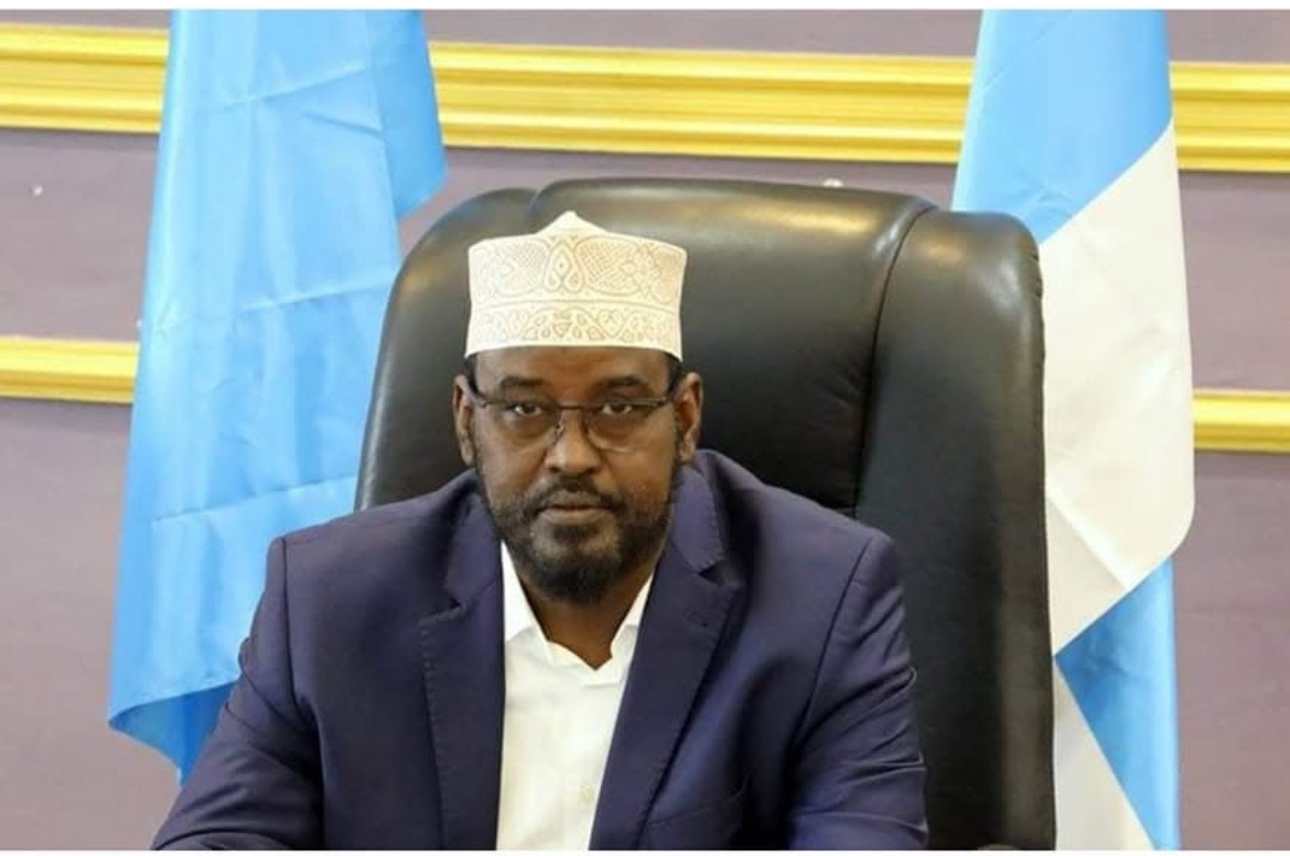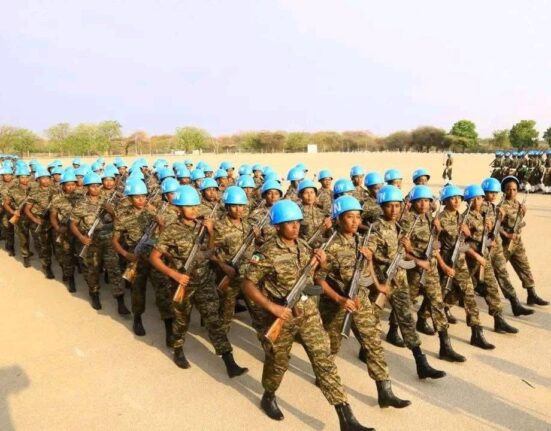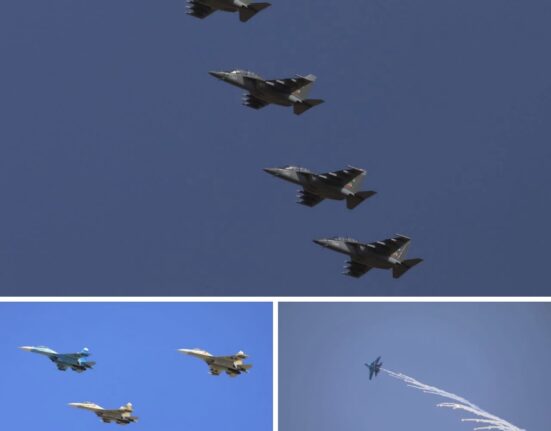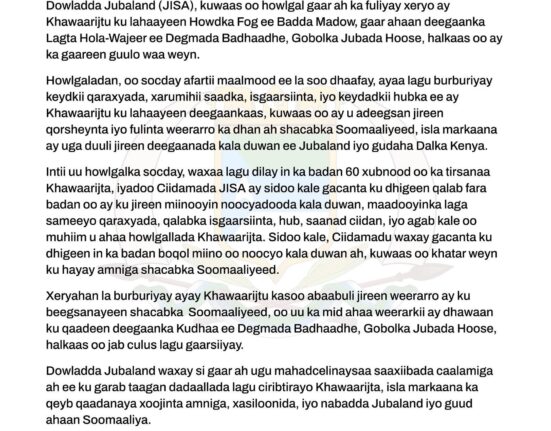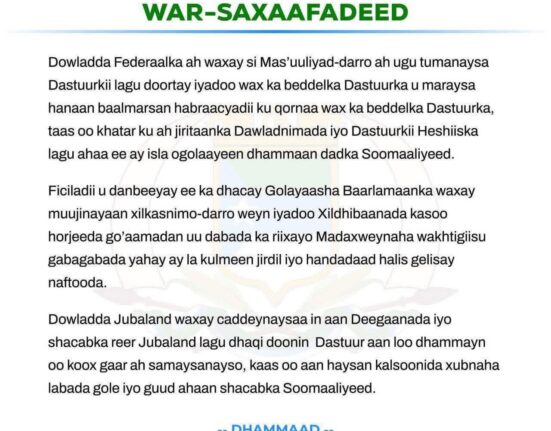By. Abdirezak Sahane Elmi – Author, Regional Political Analyst & Former Ethiopian Government Official
Executive Summary
This investigative report exposes a dangerous and ongoing project aimed at destabilizing the Federal Member State of Jubaland, a crucial security buffer in southern Somalia. The plan, hatched in Cairo and implemented through Mogadishu’s highest political and intelligence circles, threatens not just Jubaland but the stability of Kenya, Ethiopia, and the broader Horn of Africa.
The key architects, Somalia’s President Hassan Sheikh Mohamud, National Intelligence and Security Agency (NISA) chief Mahad Salad, Egypt’s President Abdel Fattah el-Sisi, and the head of Egyptian intelligence, have forged a covert bilateral agreement. Funded by Egypt in cash, weapons, and military equipment, the project aims to:
1. Weaken Jubaland’s leadership and create a security vacuum.
2. Expand Egypt’s geopolitical influence in the Horn to undermine Ethiopia in the Nile dispute.
3. Disrupt Kenya’s security and reduce its regional influence.
The first attempt to destabilize Jubaland in Ras Kamboni, ended in a humiliating defeat for the attackers, but the conspiracy continues. President Ahmed Mohamed Islam (Madobe), a respected statesman and unyielding opponent of extremist forces, is the primary target. His cooperation with Kenya and Ethiopia in counterterrorism efforts directly threatens the Cairo–Mogadishu plan.
Unless regional and international actors act now, by strengthening Jubaland’s defenses, confronting Mogadishu’s destabilization tactics, and curbing Egypt’s covert interference, the Horn risks sliding into a multi-front crisis involving terrorism, state collapse, and humanitarian catastrophe.
1. Introduction: Why Jubaland Matters
Jubaland is not simply another Somali federal state. Its geopolitical position, security role, and regional alliances make it a cornerstone of stability in the Horn of Africa. Bordered by Kenya to the southwest, Ethiopia to the north, and the Indian Ocean to the east, Jubaland controls some of Somalia’s most strategic border crossings and coastal areas.
It serves as a buffer zone against Al-Shabaab infiltration into Kenya and Ethiopia, while also facilitating humanitarian aid delivery and legitimate trade. Its capital, Kismayo, is both a commercial hub and a vital logistical base for counterterrorism operations.
Over the last decade, Jubaland’s government, under President Ahmed Mohamed Islam—has proven to be an effective partner to both the African Union Transition Mission in Somalia (ATMIS) and neighboring countries in reducing militant control and expanding security zones.
For Kenya, Jubaland’s stability directly shields Garissa, Wajir, and Mandera counties from cross-border militant incursions. For Ethiopia, it helps secure the Somali Region from extremist infiltration and arms smuggling. Losing Jubaland’s stability would mean exposing these areas to uninterrupted terrorist access.
2. Background on President Ahmed Mohamed Islam
Ahmed Mohamed Islam, known widely as Madobe, is not just a political figure—he is a frontline leader shaped by Somalia’s decades of conflict.
• Rise to Leadership: Ahmed’s political career began in the early 2000s, but his leadership was solidified during the fight to liberate Kismayo from extremist control in 2012.
• Security Achievements: Under his watch, Jubaland’s security forces have pushed Al-Shabaab further from key urban centers, disrupting their coastal and border smuggling routes.
• Regional Alliances: Ahmed has cultivated deep trust with Kenyan and Ethiopian security establishments, based on shared intelligence operations, joint patrols, and coordinated strikes.
• International Credibility: Unlike many Somali leaders, Ahmed is recognized abroad as a consistent and trustworthy partner, especially on counterterrorism and anti-piracy measures.
These qualities, integrity, independence, and effective governance make him an obstacle to Mogadishu’s centralization ambitions and to Egypt’s interference agenda.
3. The Cairo–Mogadishu Conspiracy
Multiple security insiders confirm that the destabilization of Jubaland is part of a deliberately planned Cairo–Mogadishu operation.
Key Players:
• Hassan Sheikh Mohamud – President of Somalia.
• Mahad Salad – Director of NISA, Somalia’s intelligence apparatus.
• Abdel Fattah el-Sisi – President of Egypt.
• Egyptian Intelligence Chief – Strategic coordinator for the project.
Objectives:
1. Destabilize Jubaland to discredit Ahmed Mohamed Islam and dismantle his administration.
2. Expand Cairo’s influence in the Horn, particularly as leverage in the Nile water dispute against Ethiopia.
3. Undermine Kenya’s border security to reduce Nairobi’s operational advantage in regional diplomacy and security matters.
Funding and Logistics:
Egypt has reportedly provided direct cash injections, advanced weaponry, and operational training through covert channels. Mogadishu’s leadership has used these resources to arm loyalist militias, conduct disinformation campaigns, and provoke armed clashes in Jubaland territory.
4. The First Operation: Ras Kamboni
The first operational test of this plan unfolded in Ras Kamboni, a strategic coastal area near the Kenyan border. Federal-aligned forces attempted a surprise offensive to gain a foothold in Jubaland territory.
What Happened:
• The offensive force was composed of Mogadishu-loyalist units backed by newly acquired arms and trained with Egyptian assistance.
• The aim was to provoke a security crisis that would justify federal military occupation.
• Jubaland’s security forces, anticipating the move, counter-attacked decisively.
The operation ended in a clear defeat for Mogadishu’s allies, with significant loss of equipment and morale.
Aftermath:
Cairo’s planners, frustrated by the setback, demanded an urgent reassessment. Hassan Sheikh and Mahad Salad traveled to Egypt last month to meet directly with Egyptian intelligence officials. According to reliable reports, Egypt insisted that the next attempt must succeed—“failure will not be tolerated.”
5. Egypt’s Strategic Play in the Horn of Africa
Egypt’s interest in destabilizing Jubaland is not about Somali domestic politics, it is about regional water and power politics.
The Nile Connection:
• Egypt views Ethiopia’s Grand Ethiopian Renaissance Dam (GERD) as a strategic threat to its water security.
• Weakening Ethiopia’s security environment, by fomenting instability in the Somali Region and along its borders, serves Cairo’s negotiating leverage.
Historical Precedent:
Egypt has a long record of covert engagement in Somali affairs, using political funding, military training, and ideological networks to influence leadership. The current operation is simply the latest and perhaps most dangerous-iteration of this strategy.
6. Hassan Sheikh’s Political Culture of Division
Hassan Sheikh Mohamud has repeatedly undermined Somalia’s federal framework in favor of centralizing power in Mogadishu. His methods include:
• Weakening Federal States: Starving them of resources while funding rival factions.
• Empowering Clan Militias: Using identity politics to create loyalist armed groups.
• Politicizing Security Forces: Deploying the Somali National Army not against terrorists, but against political opponents.
The lifting of the UN arms embargo in 2023 was a diplomatic victory for Mogadishu, but a disaster in practice. Weapons have flowed into Al-Shabaab hands multiple times, directly undermining the country’s own security.
7. Why Ahmed Mohamed Islam is Targeted
The Cairo–Mogadishu plan identifies Ahmed as a “non-compliant” leader for three reasons:
1. His uncompromising fight against terrorism disrupts networks tolerated by certain political actors.
2. His deep cooperation with Kenya and Ethiopia is a barrier to Egypt’s regional ambitions.
3. His personal integrity makes him immune to the transactional politics Mogadishu thrives on.
8. The Regional Domino Effect if Jubaland Falls
If Jubaland is destabilized:
• Kenya will face increased cross-border raids, bombings, and refugee flows.
• Ethiopia will see intensified arms smuggling and extremist infiltration into Somali and Oromia regions.
• Regional trade through Kismayo port will be disrupted, worsening humanitarian needs.
9. International Complicity and Silence
While Egypt and Mogadishu actively pursue their plan, international organizations have remained passive. AU, IGAD, and UN missions have failed to address the direct threat to federalism and regional stability. Some Gulf states, prioritizing alliances with Egypt, have also looked the other way.
10. Recommendations
1. Security: Immediate military and intelligence support for Jubaland from Kenya, Ethiopia, and trusted international partners.
2. Diplomacy: Regional condemnation of Egypt’s interference and pressure on Mogadishu to halt its campaign.
3. Accountability: Conditionality on foreign aid to Somalia linked to non-interference in federal member states.
11. Conclusion: Defending the Horn’s Frontline
Jubaland is more than just a Somali federal state it is the first line of defense for the Horn of Africa. The people of Jubaland, under President Ahmed Mohamed Islam, have proven their resilience against both extremist forces and political betrayal.
If this Cairo–Mogadishu operation succeeds, the consequences will reverberate far beyond Jubaland’s borders, pushing the Horn into a cycle of terrorism, instability, and regional confrontation.
The choice for regional and international actors is clear: act now, or pay a far higher price later.
By. Abdirezak Sahane Elmi – Author, Regional Political Analyst & Former Ethiopian Government Official


